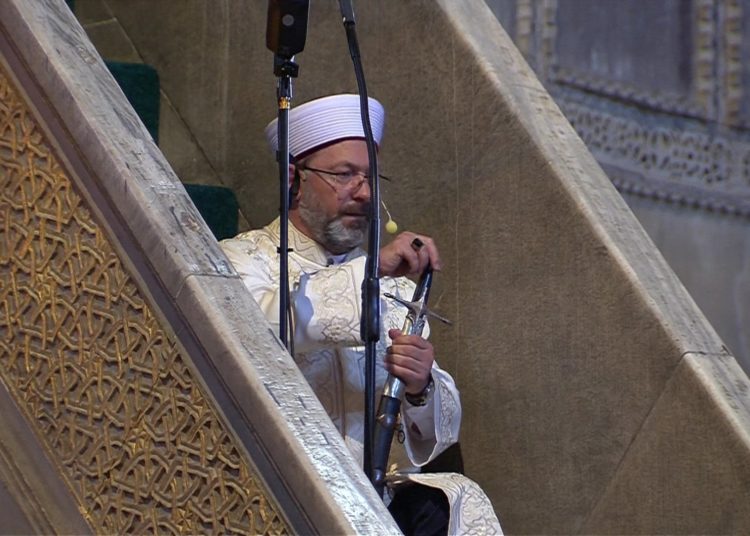Nordic Monitor
Turkey’s Religious Affairs Directorate (Diyanet) aims to grow over the next two years amid ongoing economic crises, according to its performance program for 2020 published on its website.
Diyanet employs around 105,000 people, making it one of Turkey’s largest state institutions.
Under the rule of President Recep Tayyip Erdoğan, the state religious body has grown exponentially and its budget has quadrupled in the last two decades. The yearly performance program was drafted in accordance with the Diyanet’s five-year strategic action plan.
The official program (pages 55-56) reveals that the Diyanet was allocated a budget of 11.6 billion Turkish lira in 2020 and is expecting to receive 12.4 billion lira for 2021 and 13.2 billion lira for 2022 from the Turkish government. The top religious body’s budget will continue exceeding that of other government ministries by a wide margin.
The Diyanet’s 2019 budget was increased by 34 percent compared to the previous year, according to official figures. The document indicates that the most of that amount will be spent on salaries during the three years.
According to a report by the Turkish BirGün daily, the Diyanet spent 5.6 billion lira in the first half of 2020, surpassing the expenditures of 28 public agencies including the ministries of Foreign Affairs, Culture and Tourism, and Industry and Technology for the same time period. Turkey’s religious body has used 4.6 billion lira of that amount for personnel expenses, BirGün said, citing data from the Ministry of Finance and Treasury.
The Diyanet’s 2019 Annual Report revealed how the institution has expanded its activities with more manpower last year. The Diyanet that year recruited 1,558 new employees, 244 of whom were appointed directly by the head of the Diyanet, Ali Erbaş, without having to sit for an examination.
The structure and activities of the Diyanet have been increasingly synchronized with the policies of the ruling Justice and Development Party (AKP) since 2003. President Erdoğan has benefited from its network, and the Diyanet has become an actor in the imposition of his radical and political Islamist ideology.
According to official statistics the Diyanet manages approximately 87,000 mosques and employs around 105,000 staff members, including imams and other religious workers, all of whom are treated as civil servants with regular salaries.

In addition to its budget the Diyanet earns vast sums of money through its operations for the Hadj and Umrah pilgrimages and the funds transferred to the Turkey Diyanet Foundation (Türkiye Diyanet Vakfı, TDV) and through various undisclosed investments.
The TDV was initially established as a small charity organization in 1975 by the Diyanet. Today the foundation operates a vast number of businesses and has some 1,000 branches across Turkey. The TDV is also in charge of the government’s mosque projects outside the country and has completed projects in Albania, Russia, Germany, England, the United States, the Philippines and beyond. A company called KOMAŞ, which is 99.45 percent owned by the TDV, has built hundreds of religious dormitories and schools, mosques, hospitals and hotels since 1983.

The Diyanet is an ideological and political state apparatus tasked with spreading President Erdoğan’s political Islamist ideology both inside and outside the country. Under Erdoğan’s rule the Diyanet’s remit and range of activity have expanded, and it has become an important tool in Turkish foreign policy.
The annual report includes information on the 3rd African Muslim Religious Leaders Summit and other international events organized by the Diyanet in line with the Turkish government’s foreign policy priorities. The third edition of the event was held in Istanbul in October 2019 with the participation of academics, politicians and religious leaders from Africa.
Speaking at the religious event, Erdoğan pulled out all the stops in slamming the Western powers and used the occasion to talk about how Turkey has been fighting what he called neo-colonialists and imperialists. “The Western world and the UN had watched the brutal killings of 800,000 people in Rwanda over the course of three months… Those who impose arms embargoes on us today due to Operation Peace Spring [in northern Syria] provided arms and ammunition to the bloody murderers in those days. Despite the ongoing atrocities on the ground, the Western states did not even think of stopping the sale of arms to the murderers,” he said.
President Erdoğan accused Christian missionaries of changing the demographics of Africa and of converting African Muslims under the protection of the Western powers. “Although only 7 percent of the African population was Christian in the early 1900s, today Christians constitute 55 percent of the continental population. … Muslims have become minorities in many African countries,” Erdoğan stated.

After a coup attempt in Turkey on July 15, 2016, Diyanet personnel were also used to spy on critics, opponents and dissidents in other countries. Since then some European countries have launched investigations into Turkish imams linked to the Diyanet. In December 2016 Turkey had to recall Yusuf Acar, the religious affairs attaché at the Turkish Embassy in The Hague, after Dutch authorities accused him of gathering intelligence on the Hizmet/Gülen movement, a group critical of the Turkish government. Similarly, Belgian authorities rejected the visa applications of 12 Turkish imams seeking to work in the country in 2017.
The government of the central German state of Hessen recently ended its cooperation with the Turkish-Islamic Union for Religious Affairs (Diyanet İşleri Türk İslam Birliği, or DITIB). “The doubts about the fundamental independence of DITIB from the Turkish government could not be resolved,” said Minister of Culture Alexander Lorz. DITIB, the German branch of the Diyanet and the religious arm of Erdoğan’s Islamist regime, controls imams sent by the Turkish government to European countries.












